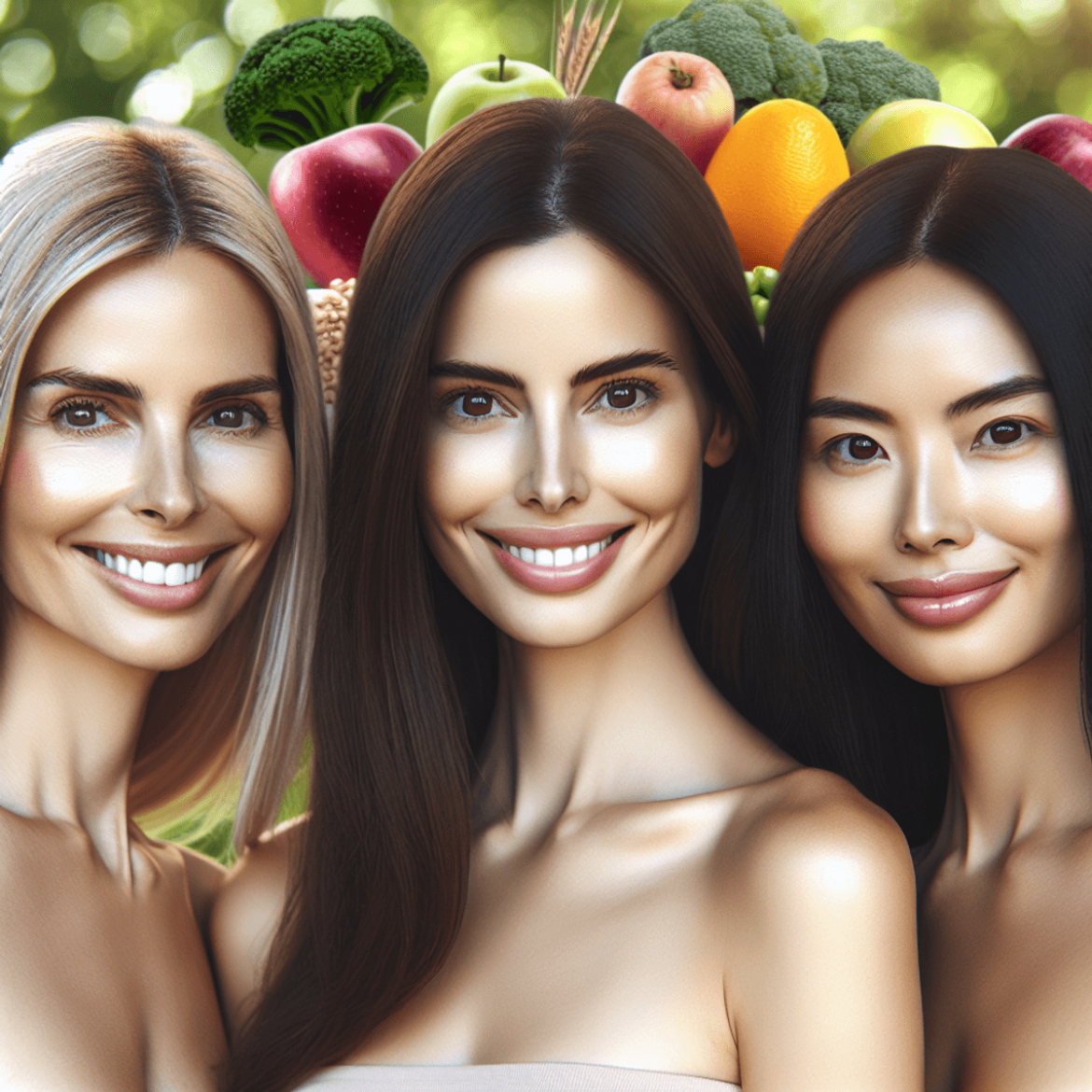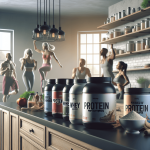Introduction
The connection between diet and beauty is often surprising. One important nutrient that plays a crucial role in maintaining healthy hair, skin, and nails is protein. These tissues rely heavily on protein for their structure and resilience.
In this article, we will explore how protein affects your hair, skin, and nails. We’ll discuss:
- The role of protein in promoting hair health
- The significance of protein for maintaining vibrant skin
- The influence of protein on nail strength and growth
- The consequences of not getting enough protein
- The ideal balance of nutrients for achieving beauty goals
- The advantages of consuming whole foods and antioxidants
- The detrimental effects of processed foods on appearance
By the end of this article, you will have a better understanding of how nutrition can enhance your beauty from the inside out.
The Role of Protein in Hair Health
Understanding the connection between protein and healthy hair is crucial. Hair is primarily composed of keratin, a fibrous structural protein that forms the building blocks of each hair strand. Keratin’s role in hair composition can’t be understated; it provides the necessary strength and resilience, making your hair less prone to breakage and damage.
Protein contributes significantly to hair strength by supplying the essential amino acids required for keratin production. When you consume adequate amounts of protein, these amino acids are utilized to repair and build new tissues, including those in your hair. This process ensures your hair remains strong and resilient against environmental stressors and daily wear and tear.
For optimal hair health, incorporating lean protein sources into your diet is essential. Some beneficial options include:
- Poultry: Chicken and turkey are excellent sources of high-quality protein.
- Fish: Rich in omega-3 fatty acids, fish like salmon and mackerel also support scalp health.
- Eggs: Contain biotin, a B vitamin that plays a crucial role in promoting healthy hair growth.
By ensuring a steady intake of these protein-rich foods, you support the structural integrity of your hair from within. This dietary approach helps maintain vibrant, healthy hair while preventing issues such as thinning and brittleness.
The Importance of Protein for Healthy Skin
Collagen and elastin are two critical proteins that form the backbone of healthy skin. Collagen provides structural support, giving the skin its firmness. Elastin, on the other hand, allows the skin to retain its shape after stretching or contracting. A diet rich in protein directly influences the production of these essential components.
Protein intake plays a significant role in maintaining skin elasticity and firmness. Consuming adequate amounts of protein helps in the synthesis of collagen and elastin, ensuring that your skin remains supple and resilient. Without sufficient protein, your skin may lose its youthful appearance, becoming saggy and less elastic over time.
Nutrients That Support Collagen and Elastin Production
Several nutrients support collagen and elastin production:
- Vitamin A: Promotes cell growth and differentiation.
- Vitamin C: Essential for collagen synthesis and offers antioxidant protection.
- Vitamin E: Protects skin cells from oxidative damage.
Incorporating foods like citrus fruits, leafy greens, nuts, and seeds can boost these vitamins’ intake, enhancing your body’s ability to produce collagen and elastin efficiently. This combination not only fosters healthy skin but also combats signs of aging by keeping your skin firm and elastic.
How Protein Affects Nail Strength and Growth
The Importance of Keratin in Nails
Nails are primarily made up of keratin, a type of protein that provides the necessary strength and resilience. Keratin forms the hardened layer of the nails, acting as a protective barrier against physical damage and environmental factors.
How Protein Prevents Thinning and Brittleness
Adequate protein intake is crucial for maintaining nail health. Insufficient protein levels can lead to brittle nails that break easily, as well as thinning of the nail plate. Consuming enough protein ensures that your body has the essential amino acids required for keratin production, promoting stronger and more resilient nails.
Dietary Sources of Protein for Healthy Nails
To support nail strength and growth, incorporate these protein-rich foods into your diet:
- Nuts: Almonds, walnuts, and peanuts are excellent sources of protein and healthy fats.
- Seeds: Chia seeds, flaxseeds, and sunflower seeds provide essential nutrients that contribute to overall nail health.
- Legumes: Lentils, chickpeas, and beans offer a plant-based protein option packed with other beneficial nutrients.
Including these foods in your daily meals can significantly impact the health and appearance of your nails.
Consequences of Inadequate Protein Intake
Thinning hair and brittle nails can often be traced back to dietary deficiencies, particularly insufficient protein levels. The body signals low protein intake through various symptoms:
- Hair loss: Protein is essential for hair strength, and a deficiency may lead to thinning hair or increased shedding.
- Nail issues: Brittle, weak nails prone to splitting or breaking can result from inadequate keratin production.
- Skin problems: Lack of protein can cause skin to lose its elasticity and appear dull.
Low-calorie or low-carb diets frequently impact protein synthesis negatively. When your diet restricts calories or carbohydrates excessively, the body may begin to break down muscle tissue for energy, which disrupts the availability of amino acids necessary for producing keratin, collagen, and elastin.
Maintaining a balanced diet is crucial. Incorporating lean proteins like poultry, fish, eggs, legumes, nuts, and seeds ensures that the body gets sufficient amino acids. This not only supports healthy hair, skin, and nails but also overall bodily functions.
The Ideal Nutritional Balance for Hair, Skin, and Nails
Achieving the right macronutrient balance is key to maintaining vibrant hair, skin, and nails. For optimal beauty, it’s recommended that 20% of your daily caloric intake comes from protein, while healthy fats should comprise 20-30%.
Importance of Carbohydrates
Carbohydrates play a crucial role in providing the energy needed for various growth processes. They fuel cellular activities essential for the production of keratin, collagen, and elastin.
Tips for Achieving a Balanced Diet
- Incorporate Lean Proteins: Include sources like poultry, fish, and eggs to ensure adequate protein intake.
- Choose Healthy Fats: Avocados, nuts, seeds, and olive oil contribute beneficial fats that support skin hydration and elasticity.
- Prioritize Complex Carbohydrates: Whole grains, fruits, and vegetables offer sustained energy without causing spikes in blood sugar levels.
This balanced approach ensures you provide your body with the necessary nutrients to support healthy hair, skin, and nails.
The Benefits of Whole Foods and Antioxidants
Overview of the Mediterranean Diet’s Emphasis on Nutrient-Dense Foods
The Mediterranean diet is known for its focus on nutrient-dense foods, emphasizing fruits, vegetables, whole grains, legumes, nuts, and seeds. This dietary pattern also includes moderate consumption of fish and poultry while limiting red meat and sweets. Such a balanced approach provides essential vitamins and minerals that support hair, skin, and nail health.
Role of Antioxidants in Promoting Healthy Skin and Hair
Antioxidants are important for keeping your skin and hair healthy. They work by neutralizing harmful molecules called free radicals that can damage cells. The Mediterranean diet is rich in key antioxidants like vitamins A, C, and E. These nutrients help reduce oxidative stress, which can lead to a more youthful appearance and prevent premature aging.
Key Antioxidant Sources:
- Vitamin A: Sweet potatoes, carrots, spinach
- Vitamin C: Citrus fruits, strawberries, bell peppers
- Vitamin E: Nuts, seeds, green leafy vegetables
How Whole Foods Can Combat Inflammation Affecting Appearance
Whole foods that are high in antioxidants can help fight inflammation in your body. Chronic inflammation can cause problems like acne, eczema, and premature aging. By including more whole foods in your diet, you may be able to lower inflammation levels and improve the texture of your skin.
Anti-Inflammatory Foods:
- Omega-3 Fatty Acids: Found in fatty fish like salmon and flaxseeds
- Polyphenols: Present in berries, olive oil, dark chocolate
- Fiber-Rich Foods: Whole grains, legumes
By making whole foods and antioxidants a priority in your diet, you not only boost your overall health but also promote vibrant hair, glowing skin, and strong nails.
Negative Effects of Processed Foods on Beauty
Consumption of ultra-processed foods and alcohol has been linked to several negative effects on beauty. These foods often contain high amounts of sugar, salt, and unhealthy fats, which can lead to inflammation and oxidative stress. This not only affects your overall appearance but also compromises the health of your skin, hair, and nails.
Impact on Nutrient Absorption and Hydration Levels:
Nutrient Absorption
Processed foods often lack essential nutrients like vitamins and minerals. They can also interfere with the body’s ability to absorb nutrients from other healthy foods. This deficiency hampers the production of key proteins like collagen and keratin.
Skin Hydration
High levels of sugar and salt in processed foods can dehydrate your skin, making it look dull and lifeless. Alcohol consumption exacerbates this issue by further dehydrating the body.
Strategies to Reduce Processed Food Intake:
- Read Labels: Be vigilant about reading ingredient labels to identify hidden sugars, salts, and unhealthy fats.
- Cook at Home: Preparing meals at home allows you to control what goes into your food.
- Healthy Swaps: Replace ultra-processed snacks with whole food options like fruits, nuts, or yogurt.
- Stay Hydrated: Drink plenty of water to help flush out toxins and maintain skin hydration.
A shift away from processed foods can significantly enhance the vitality of your hair, skin, and nails.
Conclusion: Embracing a Holistic Approach to Beauty From Within Through Nutrition
Adopting a holistic approach to beauty through nutrition can significantly enhance the health of your hair, skin, and nails. By understanding The Surprising Connection Between Protein and Healthy Hair, Skin, and Nails, you empower yourself to make informed dietary choices that promote overall beauty.
- Protein is crucial for building keratin in hair and nails, as well as collagen and elastin in the skin.
- Balanced Diet: Incorporate lean proteins, healthy fats, and complex carbohydrates to provide essential nutrients.
- Whole Foods: Rich in antioxidants, whole foods combat inflammation and support hydration.
Prioritize nutrient-dense foods while reducing processed food intake. This holistic strategy not only benefits your appearance but also promotes overall well-being. Embrace this approach for vibrant living from the inside out.



